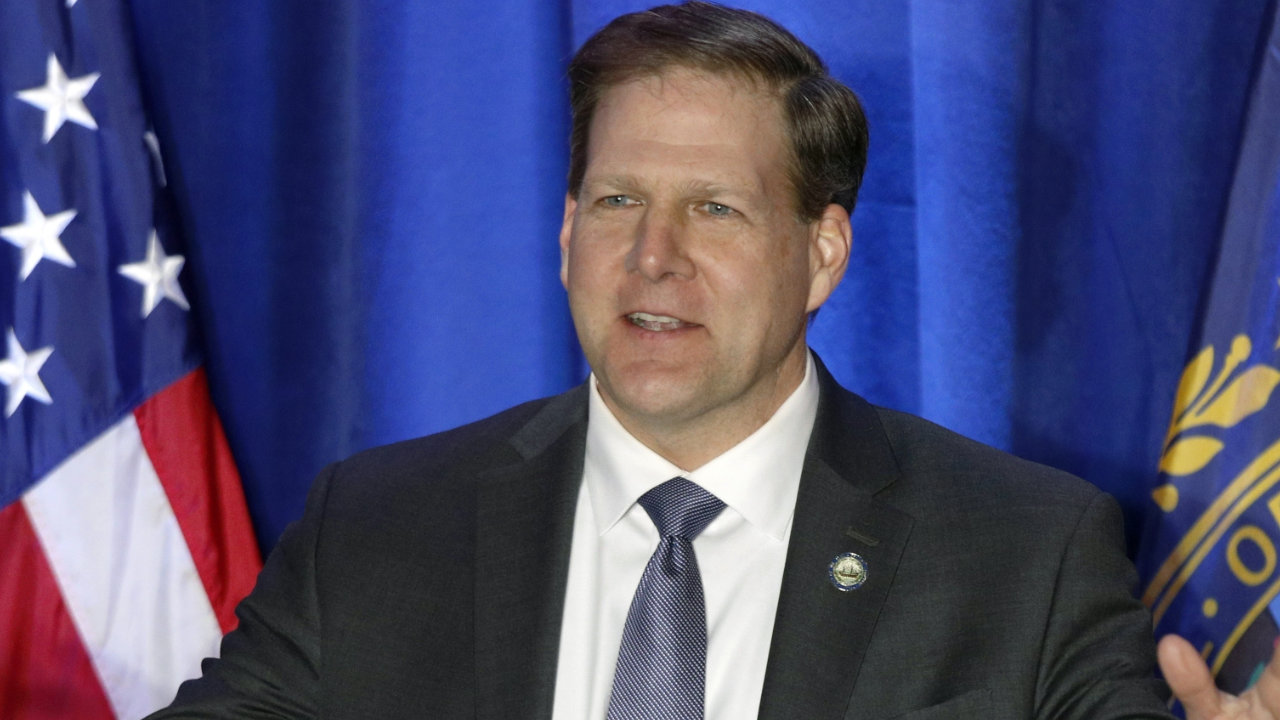
A New Hampshire lawmaker introduced legislation this week designed to allow the state’s treasury to invest in digital assets and precious metals. If House Bill 302 is passed, the New Hampshire state treasurer could use a portion of public funds to purchase precious metals, any digital asset with a market capitalization of over $500 billion, […]
The post New Hampshire Lawmaker Introduces Bill That Would Enable the State To Form a Digital Asset Treasury appeared first on The Daily Hodl.

According to Satoshi Action Fund CEO Dennis Porter, the North Dakota BTC bill “already has 11 sponsors.”
New Hampshire and North Dakota have become the latest US states to introduce legislation for a strategic Bitcoin reserve, signaling a continued push among lawmakers to diversify state treasuries with the cryptocurrency.
According to Satoshi Action Fund CEO Dennis Porter, the New Hampshire bill was introduced by Representative Keith Ammon, a Republican who represents the 40th District.
The New Hampshire bill doesn’t explicitly mention Bitcoin (BTC) but instead refers to “digital assets.” Porter said this is a way for state lawmakers to push through the legislation without causing political friction.
 The New Hampshire Bureau of Securities Regulation has issued a cease and desist order against Finstate Investment LLC, accusing it of defrauding investors via a fraudulent cryptocurrency investment website. Finstate allegedly misrepresented account activity and offered illegal guarantees against losses. A retired New Hampshire resident, persuaded via Facebook to invest $3,526 in cryptocurrency with Finstate, […]
The New Hampshire Bureau of Securities Regulation has issued a cease and desist order against Finstate Investment LLC, accusing it of defrauding investors via a fraudulent cryptocurrency investment website. Finstate allegedly misrepresented account activity and offered illegal guarantees against losses. A retired New Hampshire resident, persuaded via Facebook to invest $3,526 in cryptocurrency with Finstate, […]
A poll of voters in New Hampshire, Nevada, Ohio and Pennsylvania found 55% would be less likely to vote for anti-web3 presidential candidate, said Coinbase.
Crypto exchange Coinbase says it will focus its "Stand with Crypto" campaign on nine states in the U.S., including four “swing states” with voters polled as less likely to choose anti-crypto presidential candidates.
The four “swing states” include New Hampshire, Nevada, Ohio, and Pennsylvania, which are just some of the states the crypto exchange is set to focus its “Stand with Crypto” campaign, it said in a Sept. 19 blog.
“Polling in the fall of 2022 showed that in the key states of NH, NV, OH, and PA, over half (55%) of voters stated that they would be less likely to vote for candidates who oppose crypto and Web3,” said Coinbase, citing survey data collected in a Morning Consult poll a year prior.
52M Americans own crypto. They’re younger & more diverse than the US population in total. But their voices aren’t being heard by Congress.
— Coinbase ️ (@coinbase) September 19, 2023
That’s about to change.
Here’s what we’re doing—and what you can do to help mobilize 1M people to #StandWithCrypto: https://t.co/stmH0WVUhO
The October-published poll included 800 likely voters across the four states. Between 13-19% of respondents in the four states claimed to own cryptocurrency at the time of the polling.

Coinbase also cited that in Nevada, Ohio and Pennsylvania in particular, more than 40% of crypto owners use blockchain to remit money overseas to help family members pay for food, housing and health care for far less than what banks typically charge with international wire transfers.
The highlighted research comes amid an ongoing “Stand With Crypto” campaign, a 14-month-long campaign launched by Coinbase in August, pushing for crypto legislation in the country.
Coinbase said the campaign will focus on the four “swing states” but will also include an intense focus on Arizona, California, Georgia, Illinois, and Wisconsin, which have an “over-index” when it comes to crypto owners, it said.
“While a growing number of elected officials in Congress are advocating for legislation to regulate crypto and drive progress in the financial system, others are simply choosing to protect the status quo.
Coinbase is also set to organize a “Stand with Crypto Day” will take place in Washington D.C. on Sept. 27 to advocate for better cryptocurrency innovation and policy.
Related: Coinbase CEO says leaving US ‘not even in the realm of possibility right now’ — Report
The campaign is also encouraging crypto owners and supporters to take a moment to call their members of Congress and ask them to pass clear, sensible legislation.
“Today we kick off this effort by rallying the collective energy of the community, and taking the fight off X (formerly known as Twitter) and on to the phones."
“The campaign will encourage crypto owners and supporters to take one minute of their day to call their member of Congress and ask them to pass clear, sensible legislation,” it added.
Magazine: Binance, Coinbase head to court, and the SEC labels 67 crypto-securities: Hodler’s Digest, June 4-10

A state commission recommended that New Hampshire eliminate the gray area in which cryptocurrency companies currently operate.
New Hampshire is on the verge of becoming a national leader in cryptocurrency if its legislature follows through on recommendations made by a commission appointed by Governor Chris Sununu. The recommendations would establish a legal framework for blockchain and crypto businesses in the state, providing clarity and certainty to entrepreneurs and regulators while avoiding the onerous and largely pointless special rules federal regulators and members of Congress want to impose on the industry. The proposed rules would also protect consumers, depositors and investors.
Blockchain businesses presently exist in something of a legal gray area in the United States. Congress has provided little guidance to the regulatory agencies, resulting in confusion and difficulties in maintaining compliance. This adds unnecessary costs and sometimes causes companies to do contradictory things. Responsibility for regulating the companies is split between the Securities and Exchange Commission and the Commodity Futures Trading Commission.
While these agencies regulate different things, they have different approaches and it’s not even clear if one agency or the other has priority. Due to the lack of clarity, many cryptocurrency exchanges and businesses have moved their operations and corporate domiciles out of the United States to countries with fewer regulations. Bermuda, the Bahamas, Antigua and Barbuda and Malta are popular offshoring sites.
Related: What creditors can expect from Genesis’ bankruptcy — and what others can learn
Coinbase CEO Brian Armstrong said last year that regulatory uncertainty drove 95 percent of trading offshore. “Punishing U.S. companies … makes no sense,” he tweeted. Circle moved its exchange to Bermuda in 2019, while Fidelity Investments had to offer an exchange-traded Bitcoin fund in Canada in 2021. Digital Chamber of Congress president Perianne Boring also attributed offshoring to uncertainty, saying, “they’re not willing to operate in a gray area with potential enforcement hanging over their head.”
New Hampshire’s framework would remove that gray area, setting the rules on how digital assets should be treated by regulators — as securities, commodities or currencies — and help ensure they follow Anti-Money Laundering (AML) and fraud rules. While officials will have their work cut out to lure crypto businesses away from the Caribbean, new startups will benefit, as the new rules could attract more risk-averse investors.

The confusion and uncertainty are not only bad for the industry, which is continuing to grow. The draconian rules federal agencies and members of Congress want to impose could be worse. They will torpedo an industry that has important implications for the economy — not just people trading Dogecoin (DOGE) or pictures of apes. For instance, some companies are using blockchain ledgers to tokenize real estate to help people become homeowners without the huge down payment and monthly cost of a traditional mortgage. In the long run, strangling the blockchain industry in its cradle will also hurt American interests — much of the country’s “soft power” is linked to the fact that our financial institutions are well-regulated and have access to a lot of capital, while the U.S. dollar is a global reserve currency. As crypto grows in popularity and gets increasing attention from foreign governments, an attenuated domestic industry could allow our soft power to dissipate.
In part, much of the confusion stems from suspicion of cryptocurrency. A few high-profile cases that have resulted in criminal charges — such as the Silk Road marketplace and FTX — have created a perception that cryptocurrency is used merely for the “dark web,” Ponzi schemes and other illegal activities. Therefore, businesses trading in it need more regulation and oversight than banks and other firms. But the reality, as the commission pointed out, is that more financial crimes involve conventional currencies and firms. (Since 2016, Wells Fargo has paid more than $7 billion in fines and settlements related to illegal activity.)
To put blockchain-based businesses on a sound legal footing, the commission made three main recommendations: The state should permit limited liability protection for decentralized autonomous organizations (DAOs), establish a “blockchain dispute docket” in the court system and get committees of the legislature to update relevant legal codes, like the Uniform Commercial Code, the state’s securities law and state banking laws.
Related: Have Brazil and Argentina’s presidents heard of cryptocurrency?
Another concern that helps distinguish New Hampshire from skeptical federal regulators is its commitment to privacy and private property. The commission noted that the Financial Crimes Enforcement Network’s proposed rules require financial institutions to record and verify the identities of anyone involved in cryptocurrency transactions merely because of the possibility that cryptocurrency could be used to finance crime or terrorism. This is not only an absurd requirement that does not apply to other transactions but in itself creates a vulnerability cybercriminals could exploit, giving them access to a massive database of personal information.
The commission correctly recommended, “As financial institutions or money service businesses offer platforms to provide Crypto-asset services to clients that own crypto assets, these centralized organizations should be subject to the same [Bank Secrecy Act] BSA/AML rules as financial institutions that offer services to customers with cash … there should be an exceptionally high standard of proof before that BSA/AML regime … imposes greater burdens on crypto service businesses.”
New Hampshire cryptocurrency advocate and Tron DAO policy lead Andrew Hemingway approves of the commission’s work. “The ‘live free or die’ spirit is evident in the commission’s perspectives and recommendations,” he said in an email to me. "This spirit is also harmonious with the ethos of cryptocurrency."
Money laundering is a serious crime, but it is not unique to cryptocurrency. Law enforcement officials have said that preventing it is easier with crypto, because of the Blockchain’s transparency. If New Hampshire implements the commission’s recommendations, it will become a leader in the digital asset economy and serve as a guide to federal agencies and legislators on how to do it right.
This article is for general information purposes and is not intended to be and should not be taken as legal or investment advice. The views, thoughts and opinions expressed here are the author’s alone and do not necessarily reflect or represent the views and opinions of Cointelegraph.

According to the commission, New Hampshire should work towards building a legal framework "for sound development of blockchain technologies and its applications."
Chris Sununu, the governor of New Hampshire, has released the results of an investigation from a commission aimed at recommending legislation around digital assets and blockchain as part of a 2022 executive order.
In a Jan. 19 announcement, Sununu said the Commission on Cryptocurrencies and Digital Assets had reported the legal and regulatory status of cryptocurrencies and digital assets was “highly uncertain,” stymying development and leading to less protection for investors and consumers. The group recommended New Hampshire establish a state legal regime aimed at drawing in blockchain firms and individuals.
According to the report, sent to the governor on Dec. 22, the commission considered the human factor in its recommendations, alluding to the collapse of FTX and the arrest of its former CEO Sam Bankman-Fried — i.e. "criminal fraud resulting in the loss of billions of dollars of customer assets”. Specifically, it recommended establishing legal status for decentralized autonomous organizations, or DAOs, putting funds into the state’s court system for resolving disputes involving blockchain issues, and encouraging the government’s banking department to provide “clear, public and proactive guidance” on how financial institutions may handle digital assets.
“New Hampshire should take strong pro-active and public steps to build a better legal infrastructure for sound development of Blockchain technologies and its applications,” said the report.
The group concluded with the following:
“The Commission expects that Blockchain technologies will continue to evolve and develop, and become more integrated into our society and economy [...] this next phase of development should be accomplished not only through innovations in computer software protocols, but also should be accompanied by improvements in the legal infrastructure that necessarily operates in parallel with these activities.”
Related: Tennessee lawmaker introduces bill which would allow state to invest in crypto
Sununu referred to the report as “comprehensive and timely”. Other U.S. state governors have pushed efforts to establish regulatory clarity for crypto and blockchain, including California, while New York Governor Kathy Hochul stood behind a proposal to ban crypto mining operations not based on 100% renewable energy.
 According to a recent study analyzing Google Trends data, the cryptocurrency dogecoin’s search volume in the United States was highest in the most states as compared to other cryptos. The research also details that the leading crypto asset in terms of market capitalization, bitcoin, was the second most popular crypto asset, with ten different states. […]
According to a recent study analyzing Google Trends data, the cryptocurrency dogecoin’s search volume in the United States was highest in the most states as compared to other cryptos. The research also details that the leading crypto asset in terms of market capitalization, bitcoin, was the second most popular crypto asset, with ten different states. […]
A New Hampshire bill would commit the state to a new UCC section before finalization to show its commitment to the blockchain industry.
The New Hampshire House of Representatives passed a bill on Tuesday to adopt the new version of Chapter 12 of the Universal Commercial Code, or UCC, which will govern transfers of digital assets. The chapter is still in draft form, but if HB1503 is signed into law, New Hampshire will be the first U.S. state to adopt the chapter.
Like the draft chapter of the UCC, the bill — titled “Exempting the developer, seller, or facilitator of the exchange of an open blockchain token from certain securities laws” — seeks to create a “workaround” to make it easier to buy and sell cryptocurrencies by stipulating conditions under which “a developer or seller of an open blockchain token shall not be deemed the issuer of a security.” It passed by a vote of 187 to 150.
The UCC is a set of model laws adopted in their entirety by nearly all U.S. states to facilitate interstate trade. Therefore, the changes are likely to be accepted throughout the country eventually. New Hampshire’s adoption of the new UCC chapter into law in advance of its finalization is intended to “attract investments and jobs by signaling to this rapidly growing industry that we are open for business,” according to House Majority Leader Jason Osborne.
Representative Keith Ammon, a sponsor of the bill, said that “HB1503 is an opportunity for New Hampshire to become a leader in this [blockchain and cryptocurrency technology] industry.” The bill has yet to be considered by the state’s Senate.
New Hampshire’s Republican Governor Chris Sununu did not endorse the bill, although he issued an executive order in February to create a commission to “make findings and determinations regarding the role and effectiveness of current state laws and regulations governing cryptocurrencies and other digital assets.”
The UCC draft chapter will go to the American Law Institute for approval in May and to the Uniform Law Commission in July. Pending the commission’s approval, it will then be submitted to the states.
With its desire to make state law more crypto-friendly, New Hampshire is following in the footsteps of Wyoming, which passed a series of laws in 2018 to create similar regulatory workarounds. Texas also passed a law last year that amended its version of the UCC to become more crypto-friendly.
 The governor of the U.S. state of New Hampshire has signed an executive order establishing a commission on cryptocurrencies and digital assets. “Federal and state governments must work to bring legal and regulatory certainty to the digital asset industry because clear rules of the road foster technology and innovation,” said the governor. NH Executive Order […]
The governor of the U.S. state of New Hampshire has signed an executive order establishing a commission on cryptocurrencies and digital assets. “Federal and state governments must work to bring legal and regulatory certainty to the digital asset industry because clear rules of the road foster technology and innovation,” said the governor. NH Executive Order […]
While the US government delays providing regulatory clarity on cryptocurrencies, one state is taking proactive steps toward recognizing the nascent sector. New Hampshire Governor Chris Sununu has signed an executive order creating the Governor’s Commission on Cryptocurrencies and Digital Assets to do a wide-ranging and comprehensive survey of the digital asset space in order to […]
The post New Hampshire Governor Launches Crypto Commission via Executive Order appeared first on The Daily Hodl.